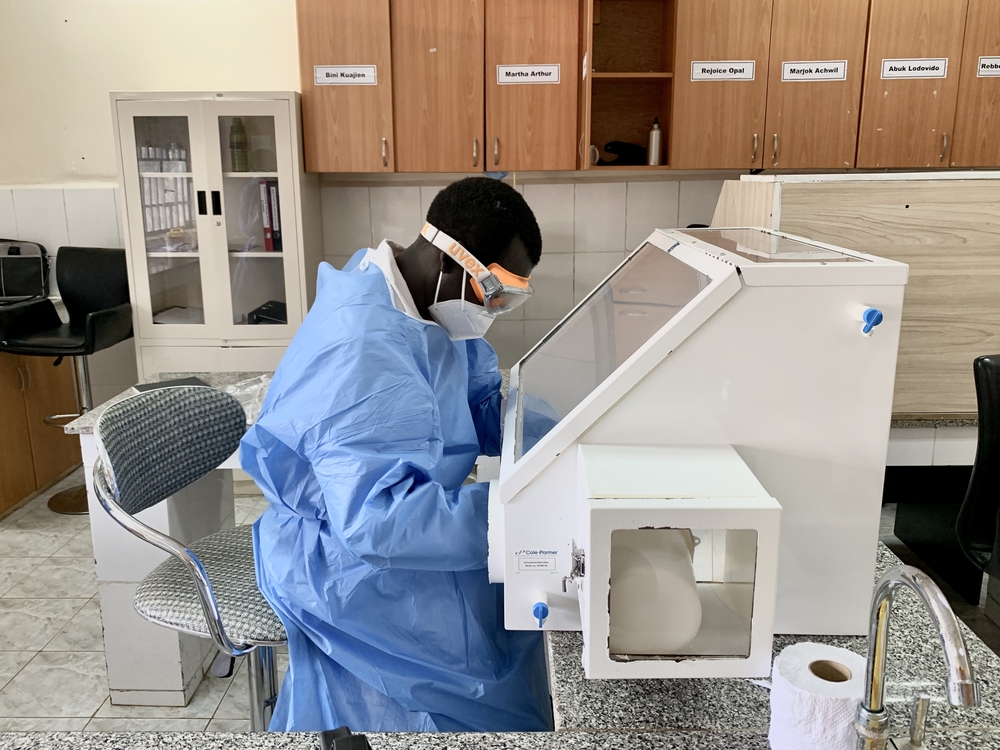Since novel coronavirus started to spread globally in early 2020, overwhelming the world’s best healthcare systems one after another, countries like South Sudan were bracing to what was yet to come. Exhausted by the years of violent conflict, political instability and economic decline, it was feared South Sudan’s fragile public healthcare system – which is largely reliant on international organisations – would not be prepared to prevent or respond to a health emergency like COVID-19.
Fearing that outbreak of the virus would cause significant impact on an already dire humanitarian situation, MSF began integrating COVID-19 measures into existing projects across the country, while also starting a new specific response in Juba.
Since March 2020, MSF has worked across various locations across Juba, focusing on strengthening of infection prevention and control measures in existing health facilities, training of healthcare workers and providing health promotion activities targeting the community.
Empowering local healthcare workers
At the National Public Health Laboratory in Juba, MSF is supporting healthcare workers with trainings and technical support on how to screen patients and work safely to protect themselves. Rebecca, a 26-year-old biotechnologist at the lab laughs when she recalls that she used to hide from her family where she works: “It was until someone saw me working in the Lab and told my family that they found out.”
As COVID-19 hit the world in early 2020, the Government of South Sudan started looking for specialists in biology, microbiology and pathology to test suspected cases. With Rebecca’s expertise in microbiology, meeting job requirements was easy, telling the family was not.
“When corona came everybody was scared thinking people will start dying like flies,” she remembers. “But I reassured my family that I will do my best to protect myself and they should do the same.”
“I just want to give something back to my country,” she says.
Training and educating healthcare workers about COVID-19, and how they can protect themselves, is of critical importance in fighting the pandemic says MSF Emergency Coordinator Tejshri Shah: “Health workers are really at the frontline in fighting COVID-19. It is crucial they are empowered with the knowledge and the tools, not only to identify patients and to protect themselves, but so they pass this information on to the community. People will listen to their health workers, the people they meet every day, and so it’s really important that the health workers understand what the virus is, how it presents, how they can protect themselves.”

Giir, a microbiologist, examines samples of COVID-19 suspected cases in the National Public Health Laboratory (NPHL) in Juba. Giir supervises a team of eight biotechnologists of the NPHL’s reception area, where the samples are brought for testing from all over the country. After the samples are registered and coded, they are send to an extraction room where another technician will determine whether the sample is positive for COVID-19 virus. [© MSF / Tetiana Gaviuk]
Like Rebecca, Giir, a 29-year-old microbiologist from Wau, a town in north-western South Sudan, is now at the forefront of the pandemic response despite his family’s disapproval. Giir supervises a team of eight biotechnologists of the reception area of the Laboratory, where the samples are brought for testing from all over the country. When Giir’s parents learned about his job, they asked him to give it up, as they were worried he may bring the virus home. “If others can do it, why not me. This is my area of specialisation and I cannot run away,” was his reply to his parents.
After the first COVID-19 positive patient was confirmed in South Sudan on 5 April 2020, and tracing and testing of contacts began, working in the Laboratory was challenging Giir remembers: “At the beginning there was no system in place and the work was very difficult. Everyone was scared and it was stressful for each of us here. Since MSF started supporting us, things have improved. Today, if we receive a sample, the result will be ready next day. Previously, it could take two to three days or even get lost.”
In Juba, MSF continues to work with the Government of South Sudan to strengthen infection prevention and control measures and to train healthcare professionals like Rebecca and Giir on how to screen patients and protect themselves. In addition to providing technical support to the National Public Health Laboratory and supporting eight biotechnologists, we are also supporting Juba Teaching Hospital – the largest hospital in the capital. Further, we installed 12 hand washing stations in health facilities, public and densely populated areas such as Konyo Konyo market and informal internally displaced persons settlements, as well as provided health education and hygiene promotion within the community and health facilities.
To date there have been over 2,600 confirmed COVID-19 cases in South Sudan. While the numbers have not reached the alarming proportions of those seen in other countries around the world, and despite the improvements in the National Public Health Laboratory in Juba, limited testing capacity across the country, and therefore possible community transmission, continues to be a concern.
![biotechnologist Rebecca Achok, registers and codes samples of COVID-19 suspected cases in Juba. [© MSF/Tetiana Gaviuk ] biotechnologist Rebecca Achok, registers and codes samples of COVID-19 suspected cases](/sites/default/files/styles/hero_desktop/public/msfimages/news/msf335569_medium.jpg?itok=TM9EkkIi)